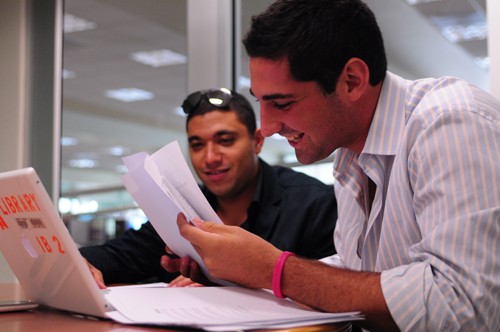A UA student has transformed one of his hobbies into a successful online company.
Evan Paul, a communications junior, founded eGamePlace.com at age 15. The company provides a trading platform for people across the country to exchange video games. The Web site has about 86,000 active users.
The site supports all systems across all consoles, and users can also trade across systems, Paul said.
The company works through an automated process. One person makes a list of the games they have and the games they want. That person is matched with someone else who has corresponding lists. Both people then pay for the exchange and send their game through the mail. The transfer itself costs $1.95, plus the cost of shipping. Within a few days, both parties will receive their games.
If one person fails to send their game, the company will reimburse the other person. Users also rate other users in a system similar to eBay’s. The site also acts as a community because members can talk to other members about games, Paul said.
Paul’s inspiration for the company came from personal experience. He was diagnosed with dyslexia before his freshman year of high school, and said video games served as a release for him as a child.
“”Video games provided me with an escape, an outlet,”” he said. “”It was something I excelled at.”” At that point, he was beating video games about every two weeks.
“”I felt like it was something I needed and never had,”” he said about the concept of the company. To start the company, Paul needed to find a lawyer and initial seed money, which he received from family and friends.
“”It took persistence and not giving up and not taking no for an answer,”” he said.
He launched the company in October 2004 in Boston, Mass. Paul said the company has grown by word of mouth in gaming communities.
eGamePlace.com is doing well in this economy, as new games can cost $60 to $70, Paul said.
“”People don’t want to spend money when they can trade,”” he said.
It takes the average college-student gamer between two and six weeks to finish a game, according to Paul.
“”It’s a cost effective way to get a new game,”” he said. “”That money can go elsewhere.”” Paul said the internet has made doing business more manageable. eGamePlace.com has 15 full-time workers in Nepal working on development and building the technology. They also have about four workers in their satellite office in Bangladesh and two people working in Boston on marketing.
Paul is currently in negotiations with a well-known family in the Middle East who has offered nearly $12.5 million for the company. Paul said he has also received offers from large public companies that are interested in buying the company. He stressed that he will only sell to the right buyer and does not want the company to become commercialized.
“”It’s for the gamers,”” he said.
In the future, Paul hopes to expand the company to an international market. He hopes to launch the company in parts of Europe within about three months and in the Middle East within six to eight months. Paul said some challenges with expanding the company internationally will be dealing with copyright, censorship and cultural norms in other countries.
Mohammed Sharawi, a regional development senior and friend of Paul’s, has been helping to find buyers overseas. He said his coursework has applied to the work he is doing with eGamePlace.com.
“”It looks at the location and the impact of the business when it opens,”” he said.
Sharawi said he became interested in the company because of the trading aspect.
“”A lot of people aren’t rich,”” he said. “”The average family can not afford to buy a game every two weeks.””
Sharawi was born in the United Arab Emirates and was raised in Kuwait. He came to the United States for college. He speaks Arabic and English, as well as some other dialects.
“”It’s easier to talk to investors if you speak their language,”” he said. “”It’s a lot easier if you understand the culture and not say words they don’t like.””
With their plans for expansion, Paul said it is sometimes difficult to balance school and business.
“”I’ve worked so hard for everything, I want to keep going,”” he said.
He said sometimes he hears students complain about not wanting to go to class or do homework, but for him the work is twice as difficult.
“”If you can sit down and drive yourself to finish it, you can do the same thing in business,”” he said.
Paul also said people should follow their passion in life.
“”I followed my dream to do something I enjoyed,”” he said.









